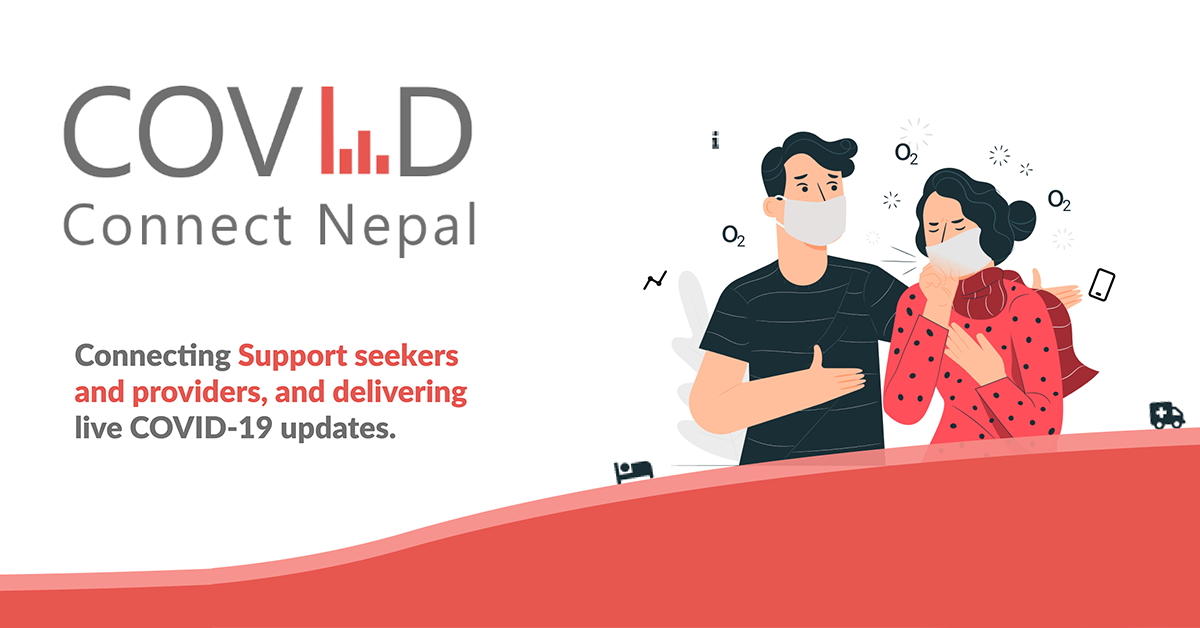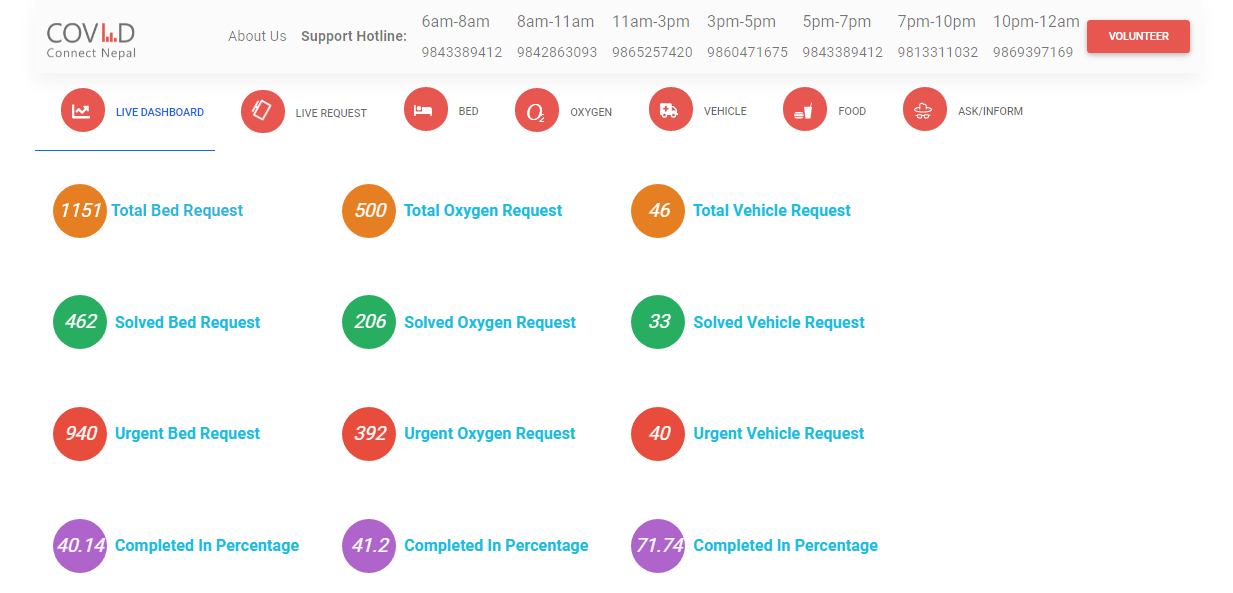Amidst stay-at-home orders to remain safe from the contagion, there are many people among us dealing with Covid and non-Covid cases and need immediate medical attention. Covid Connect Nepal is one such online platform that has been developed to help individuals in dire need of critical care. This is a centralized platform that bridges the gap between medical facilities and patients at this point in time.

One can go to their website or message on their Facebook page to seek help. Over 130 volunteers are working 24 hours to support the service seekers.
The volunteers are working from different parts of Nepal. The volunteers handle the operations, communicate with the hospitals and check for the availability of ICU beds, ambulance, Remdesivir, blood plasma and other critical needs for both Covid and Non-Covid patients. They also arrange private vehicles for the patients, if the ambulance is not available.
The volunteers have been divided into 6-7 groups. Each member works for 3-4 hours every day. The volunteer team consists of medical students, non-medical students and few doctors. The volunteers fix a virtual appointment with the doctors if anyone needs a consultation. “This is to make sure that the doctors don’t feel overwhelmed with continuous calls,” Pandey shares.

With the number of cases rising every day, the team is looking for more volunteers. Anyone who is interested to volunteer can fill up the volunteer registration form on their website.
“The team coordinates with individuals or organizations who are willing to lend the vehicles,” says Suraj Raj Pandey, one of the team members and initiators of the platform.
The team is also preparing to distribute food to the needy ones. For this, they are using crowdfunding platforms including Gofundme.org to get funds from Nepalis living outside Nepal.
Just as the Covid cases were getting worst in neighbour India, a group of eight youth consisting of entrepreneurs and professionals started researching on availability of oxygen and ICU beds in Nepal. The situation was grim. The data regarding the number of beds and oxygen was not concrete, people had started hoarding oxygen and there were no ways to get help if the cases surged.
ALSO READ: e-Commerce Companies Demand for Clarity in Rules & Seamless Operation During Lockdown
They initiated ‘Covid Connect Nepal’ from the last week of April through a Facebook page. They were parallelly developing an online portal covidnepal.org. The portal lists, hospital capacity data, contact details of hospitals, availability of ICU beds, ventilators and emergency hotline numbers.
Interestingly, most of the team members haven’t met each other. They do their duties from their place and connect virtually whenever required. The volunteers mostly from Kathmandu, Pokhara and Biratnagar connect with the service seekers through social media, online portal and telephones. Similarly, the team members communicate with each other through virtual mediums including zoom, Google Meet and social media message groups.
“We receive an average of 900 calls and messages every day,” shares Eeda Rijal, support lead and initiator of Covid Connect Nepal.
As of May 12, they have received around 2500 requests. Pandey shares that around 50 percent of those inquiries have been addressed and solved. Around 75 percent of requests are from Kathmandu.
The team also has been appreciated by Covid 19 Crisis Management Center (CCMC) and the Ministry of Health and Population. “This is a good gesture by the government. But we want the government to work rapidly on increasing the supplies including ICU beds, oxygen, ambulance and others,” Pandey shares.
For this, the government has to collaborate with private sectors who have been working in different ways to bring rapid solutions to fight against the pandemic.
But he shares that the concerned government bodies are unwilling to collaborate and also haven’t discussed anything about expanding the critical care services. Recently, they have been facing huge challenges because of unavailability of the emergency needs in different places.
The medical students in the team work to identify critical and non-critical patients whenever needed. This is to ensure that critical patients get to the service on time. The team is also continuously lobbying about the dire need of critical resources to the government as well as the international media fraternity.
READ NEXT: Danphe Care: This Telehealth Platform is Providing Remote Consulting to Covid-19 Patients
-
TechLekh Awards: Best Phones of 2025 in Nepal Winners!Ooooooooooh boy, what a year it was for smartphones, even in Nepal! Phones have been…
-
TechLekh Awards: Best Tablets of 2025 in Nepal Winners!The smartphone scene in Nepal was absolutely crackling this year with constant new launches and…
-
TechLekh Awards: Best Scooters of 2025 in Nepal Winners!Scooters have played a major role in shaping everyday mobility in Nepal. They have always…
-
TechLekh Awards: Best Bikes of 2025 in Nepal Winners!Motorcycling in Nepal has always meant more than just getting from one place to another.…
-
TechLekh Awards: Best Cars of 2025 in Nepal Winners!Electric vehicles continue to dominate Nepal’s market in 2025, and Chinese manufacturers still lead the…
-
Bajaj Pulsar NS 125 Launched in Nepal with Major Feature Update!HIGHLIGHTS Bajaj Pulsar NS 125 price in Nepal starts at Rs. 3.05 Lakhs to Rs.…
-
Bajaj Bike Price in Nepal (February 2026 Updated)This is the complete price list for the Bajaj bike price in Nepal for 2026.…
-
Infinix Note Edge with 6500mAh Battery Expected to Launch Soon in NepalHIGHLIGHTS The Infinix Note Edge is expected to launch soon in Nepal. The phone is…




















